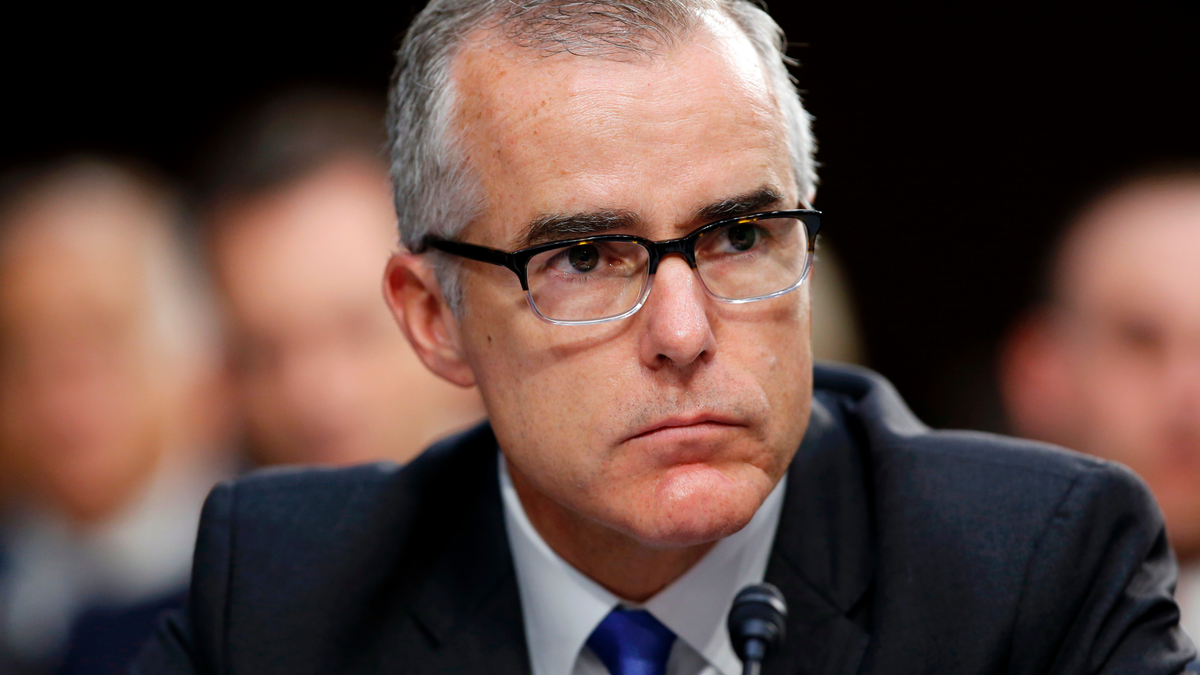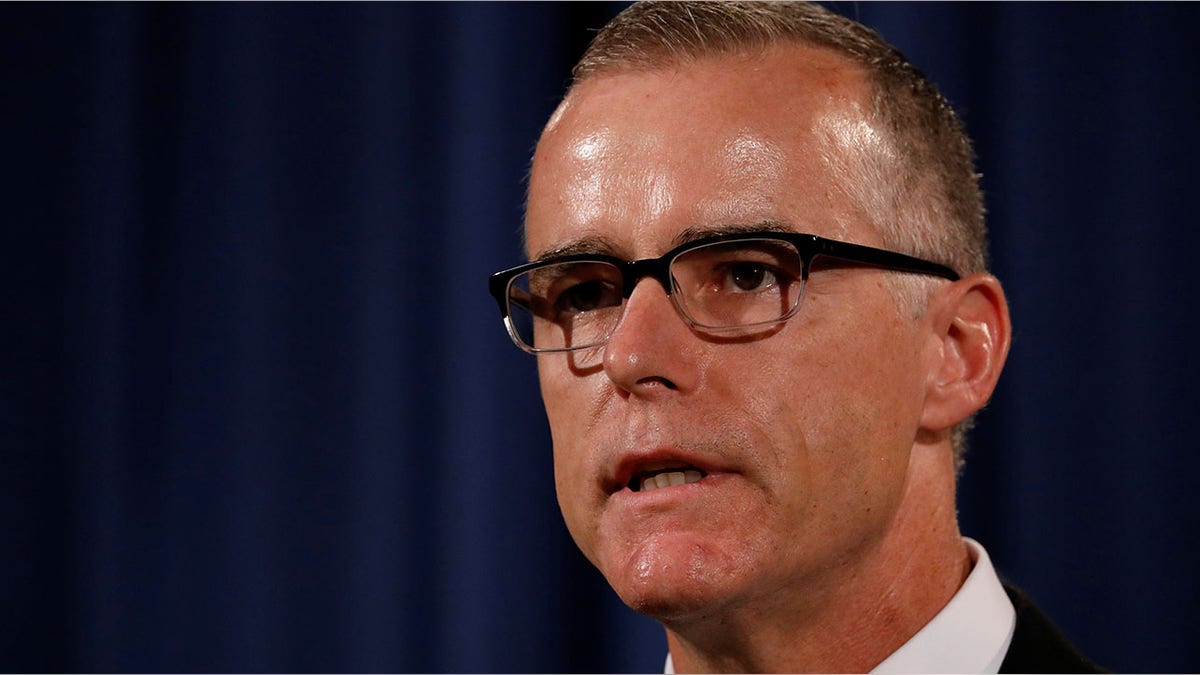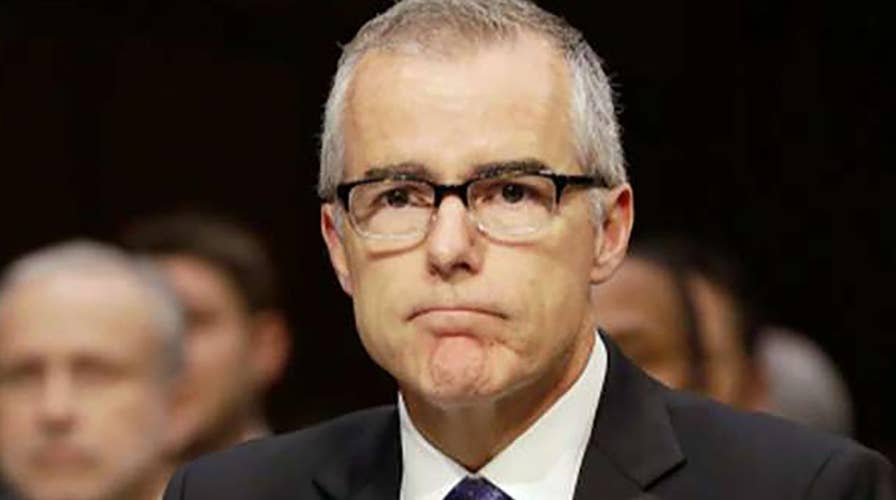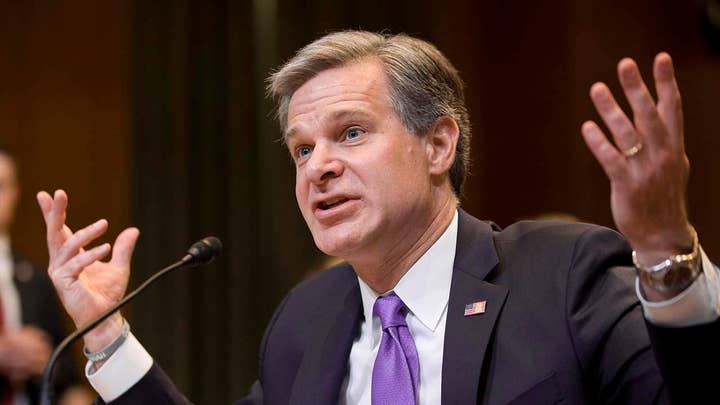McCabe admits FBI 'weakness' in FISA warrant process
Former acting FBI director Andrew McCabe claims there is an 'inherent weakness' in the process the FBI uses to obtain warrants under the Foreign Intelligence Surveillance Act.
At least two of the FBI’s surveillance applications to secretly monitor former Trump campaign adviser Carter Page lacked probable cause, according to a newly declassified summary of a Justice Department assessment released Thursday by the Foreign Intelligence Surveillance Court (FISC).
The DOJ's admission essentially means that the Foreign Intelligence Surveillance Act (FISA) warrant authorizations to surveil Page, when stripped of the FBI's misinformation, did not meet the necessary legal threshold and should never have been issued. Democrats, including Rep. Adam Schiff, had previously insisted the Page FISA warrants met "rigorous" standards for probable cause, and mocked Republicans for suggesting otherwise.
The June 2017 Page FISA warrant renewal, which was among the two deemed invalid by the DOJ, was approved by then-Acting FBI Director (and now CNN contributor) Andrew McCabe, as well as former Deputy Attorney General Rod Rosenstein. The April 2017 warrant renewal was approved by then-FBI Director James Comey.
“Today’s unprecedented court filing represents another step on the road to recovery for America’s deeply damaged judicial system," Page said in a statement to Fox News. "I hope that this latest admission of guilt for these civil rights abuses by the Justice Department marks continued progress towards restoring justice and remedying these reputationally ruinous injuries.”
Added Iowa GOP Sen. Chuck Grassley, who previously chaired the Judiciary Committee: “It’s about time. It’s about time federal authorities entrusted with our most powerful and intrusive surveillance tools begin to own up to their failures and abuses, and take steps to restore public confidence. ... Time will tell if the department will continue working to fix its errors and restore trust that it won’t disregard Americans’ civil liberties. Its admission and cooperation with the FISC is a step in the right direction."
FISC Presiding Judge James Boasberg, in the Jan. 7 order that was published for the first time Thursday, further required the government to explain in a written statement by Jan. 28 the "FBI's handling of information" obtained through the Page warrants and subsequent renewals.
Boasberg specifically noted the DOJ found "there was insufficient predication to establish probable cause to believe that Page was acting as an agent of a foreign power" because of the "material misstatements and omissions" in the warrant applications.

Then-FBI acting director Andrew McCabe, now a CNN contributor, approved one of the now-discredited FISA applications. (AP Photo/Alex Brandon, File)
Although the DOJ assessment technically only covered two of the applications to renew the Page FISA warrant, the DOJ "apparently does not take a position on the validity" on the first two Page FISA applications, Boasberg said, seemingly indicating that the DOJ seemingly did not want to defend their legality either.
The government "intends to sequester information acquired pursuant to those" FISA applications "in the same manner as information acquired pursuant to the subsequent dockets," the judge said, possibly indicating that those applications are still under review.
Boasberg noted that it is illegal for the government to intentionally disclose or use "information obtained under color of law by electronic surveillance, knowing or having any reason to know that the information was obtained through electronic surveillance not authorized." A lawful FISA warrant, when approved by the FISC, allows the FBI to surveil not only the target of the warrant, but also individuals who communicate with the target and the target's associates.
It was not clear what information, if any, the FBI gleaned from the Page FISA and then used in subsequent court arguments; any such evidence would likely be ruled inadmissible, given the DOJ's admission that the underlying warrants were invalid.
The revelations Thursday were yet another embarrassment for the FBI, which DOJ Inspector General Michael Horowitz has found made repeated errors and misrepresentations -- and, in one case, deliberately falsified evidence -- before the FISC as the bureau sought to surveil Page in 2016 and 2017.
The FBI's FISA applications to monitor Page heavily relied, Horowitz confirmed, on a now-discredited dossier funded by the Hillary Clinton campaign and Democratic National Committee (DNC), as well as on news reports that secretly relied on the dossier's author.
Much of the Steele dossier has been proved unsubstantiated, including the dossier's claims that the Trump campaign was paying hackers in the United States out of a non-existent Russian consulate in Miami, or that ex-Trump lawyer Michael Cohen traveled to Prague to conspire with Russians. Special Counsel Robert Mueller also was unable to substantiate the dossier's claims that Page had received a large payment relating to the sale of a share of Rosneft, a Russian oil giant, or that a lurid blackmail tape involving the president existed.
Pursuant to Boasberg's order, the government must also sequester relevant information and provide further "explanations" concerning the damning findings of bureau misconduct contained in Horowitz's recent report, as well as "related investigations and any litigation."
That could be a reference to a variety of outstanding matters concerning the FBI's apparent mischaracterization of evidence before the FISC.
For example, the FISC has already ordered the bureau to look at all previous FISA applications involving ex-FBI attorney Kevin Clinesmith, whom Horowitz found to have doctored an email from the CIA. The FBI had reached out to the CIA and other intelligence agencies for information on Page; the CIA responded in an email by telling the FBI that Page had contacts with Russians from 2008 to 2013, but that Page had reported them to the CIA and was serving as a CIA operational contact and informant on Russian business and intelligence interests.
Clinesmith then allegedly doctored the CIA's email about Page to make it seem as though the agency had said only that Page was not an active source. The FBI also included Page's contacts with Russians in the warrant application as evidence he was a foreign "agent," without disclosing to the secret surveillance court that Page was voluntarily working with the CIA concerning those foreign contacts.
"Today’s unprecedented court filing represents another step on the road to recovery for America’s deeply damaged judicial system."
Further, Horowitz found specific evidence of oversights and errors by several top FBI employees as they sought to obtain a warrant to surveil Page. In particular, an unidentified FBI supervisory special agent (SSA) mentioned in the IG report was responsible for ensuring that the bureau's "Woods Procedures" were followed in the Page warrant application, but apparently didn't do so.
According to the procedures, factual assertions need to be independently verified, and information contradicting those assertions must be presented to the court. Horowitz found several instances in which the procedures were not followed. Horowitz's report leaves little doubt that the unnamed SSA is Joe Pientka -- a current bureau employee.
Pientka briefly appeared on the FBI's website as an "Assistant Special Agent in Charge" of the San Francisco field office late last year, according to the Internet archive Wayback Machine -- although Pientka no longer appears on any FBI website. Pientka was removed shortly after Fox News identified him as the unnamed SSA in the IG report. Twitter user Techno Fog first flagged the Wayback Machine's archive of the page.
The FBI has repeatedly refused to respond to Fox News' request for clarification on Pientka's status, even as Republicans in Congress have sought to question him.
While the FBI has promised corrective action, it apparently has not gone far enough. Earlier this month, David Kris, who has been appointed by the FISC to oversee the FBI's proposed surveillance reforms, alerted the court that the bureau's proposals are "insufficient" and must be dramatically "expanded" -- even declaring that FBI Director Christopher Wray needs to discuss the importance of accuracy and transparency before the FISC every time he "visits a field office in 2020."

In December 2017, then-FBI deputy director Andrew McCabe testified that “no surveillance warrant would have been sought” from the FISA court “without the Steele dossier information," according to a House GOP memo's findings. McCabe is now a CNN contributor.
The unclassified findings were a stark rebuke to Wray, who had filed assurances to the FISC that the agency was implementing new procedures and training programs to assure that the FBI presents accurate and thorough information when it seeks secret warrants from FISC judges. At the same time, Wray acknowledged the FBI's "unacceptable" failures as it pursued FISA warrants to monitor Page.
Kris is a former Obama administration attorney who has previously defended the FISA process on "The Rachel Maddow Show" and in other left-wing venues, making his rebuke of Wray something of an unexpected redemptive moment for Republicans who have long called for more accountability in how the bureau obtains surveillance warrants. ("You can’t make this up!" President Trump tweeted on Sunday. "David Kris, a highly controversial former DOJ official, was just appointed by the FISA Court to oversee reforms to the FBI’s surveillance procedures. Zero credibility. THE SWAMP!”)
WHAT EXACTLY DID KRIS TAKE ISSUE WITH IN THE FBI'S PROPOSED REFORMS?
Wray had specifically promised to change relevant forms to "emphasize the need to err on the side of disclosure" to the FISC, to create a new "checklist" to be completed "during the drafting process" for surveillance warrants that reminds agents to include "relevant information" about the bias of sources used, and to "formalize" the role of FBI lawyers in the legal review process of surveillance warrants.
Additionally, Wray said the FBI would now require "agents and supervisors" to confirm with the DOJ Office of Intelligence that the DOJ has been advised of relevant information. Wray further indicated that the FBI would formalize requirements to "reverify facts presented in prior FISA applications and make any necessary corrections," as well as to make unspecified "technological improvements."
But in a 15-page letter to Judge Boasberg, obtained by Fox News, Kris declared that the proposed corrective actions "do not go far enough to provide the Court with the necessary assurance of accuracy, and therefore must be expanded and improved" -- and he took aim at Wray himself.
"The focus on specific forms, checklists and technology, while appropriate, should not be allowed to eclipse the more basic need to improve cooperation between the FBI and DOJ attorneys," Kris said, noting that the FBI and DOJ have historically not always worked well together.
"A key method of improving organizational culture is through improved tone at the top, particularly in a hierarchical organization such as the FBI," Kris said, noting that Wray's public statements on the matter, while positive, have not gone far enough. "Director Wray and other FBI leaders, as well as relevant leaders at the Department of Justice, should include discussions of compliance not only in one or two messages, but in virtually every significant communication with the workforce for the foreseeable future."
Republican calls for more accountability may not go unanswered for long. Connecticut U.S. Attorney John Durham announced last year that he did not "agree" with the IG's assessment that the FBI's probes were properly predicated, highlighting Durham's broader criminal mandate and scope of review.
CLICK HERE TO GET THE FOX NEWS APP
Durham is focusing on foreign actors, as well as the CIA, while Horowitz concentrated his attention on the Justice Department and FBI.
"Based on the evidence collected to date, and while our investigation is ongoing, last month we advised the Inspector General that we do not agree with some of the report’s conclusions as to predication and how the FBI case was opened," Durham said in his statement, adding that his "investigation is not limited to developing information from within component parts of the Justice Department" and "has included developing information from other persons and entities, both in the U.S. and outside of the U.S."

























